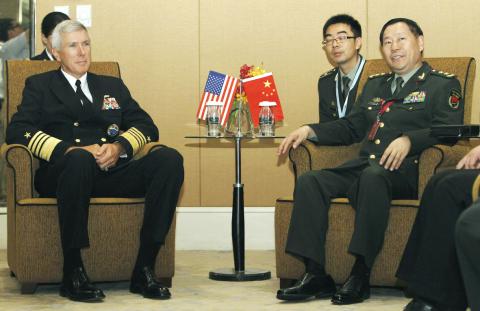Chinese warships will continue to patrol waters where Beijing has territorial claims, a top Chinese general said yesterday, amid simmering rows with neighboring countries over the South China Sea and islands controlled by Japan.
Chinese Lieutenant General Qi Jianguo (戚建國), deputy chief of the General Staff of the People’s Liberation Army (PLA), defended the patrols as legitimate and said his country’s sovereignty over the areas could not be disputed.
“Why are Chinese warships patrolling in East China Sea and South China Sea? I think we are all clear about this,” Qi told the annual Shangri-La Dialogue security conference in Singapore.

Photo: Reuters
“Our attitude on the East China Sea and the South China Sea is that they are in our Chinese sovereignty. We are very clear about that,” he said through an interpreter. “So the Chinese warships and the patrolling activities are totally legitimate and uncontroversial.”
Qi was responding to a question from a delegate after he gave a speech in which he sought to assure neighboring countries that China has no hegemonic ambitions.
“China has never taken foreign expansion and military conquering as a state policy,” he said in his speech. “Although recently hot-spot issues in China’s neighboring area keep cropping up, we have always held that conflicts and disputes should be properly solved through dialogues, consultations and peaceful negotiations.”
However, one delegate said there appeared to be growing regional skepticism over China’s peaceful intentions because it was inconsistent with moves to send naval patrols to waters where other countries have also staked claims.
China is locked in a territorial dispute with Taiwan, Brunei, Malaysia, the Philippines and Vietnam in the South China Sea.
The four Southeast Asian states have partial claims, but China says it has sovereign rights to nearly all of the sea, including waters and territories much closer to other countries and thousands of kilometers from the Chinese coast.
China, Japan and Taiwan also dispute the sovereignty of the Diaoyutai Islands (釣魚台), known in Japan as the Senkaku Islands, in the East China Sea.
Last month, Manila protested against what it called the “provocative and illegal presence” of a Chinese warship near Second Thomas Shoal (Renai Shoal, 仁愛暗沙), which is occupied by Philippine troops.

A car bomb killed a senior Russian general in southern Moscow yesterday morning, the latest high-profile army figure to be blown up in a blast that came just hours after Russian and Ukrainian delegates held separate talks in Miami on a plan to end the war. Kyiv has not commented on the incident, but Russian investigators said they were probing whether the blast was “linked” to “Ukrainian special forces.” The attack was similar to other assassinations of generals and pro-war figures that have either been claimed, or are widely believed to have been orchestrated, by Ukraine. Russian Lieutenant General Fanil Sarvarov, 56, head

SAFETY FIRST: Double the number of police were deployed at the Taipei Marathon, while other cities released plans to bolster public event safety Authorities across Taiwan have stepped up security measures ahead of Christmas and New Year events, following a knife and smoke bomb attack in Taipei on Friday that left four people dead and 11 injured. In a bid to prevent potential copycat incidents, police deployments have been expanded for large gatherings, transport hubs, and other crowded public spaces, according to official statements from police and city authorities. Taipei Mayor Chiang Wan-an (蔣萬安) said the city has “comprehensively raised security readiness” in crowded areas, increased police deployments with armed officers, and intensified patrols during weekends and nighttime hours. For large-scale events, security checkpoints and explosives

PUBLIC SAFETY: The premier said that security would be tightened in transport hubs, while President Lai commended the public for their bravery The government is to deploy more police, including rapid response units, in crowded public areas to ensure a swift response to any threats, President William Lai (賴清德) said yesterday after a knife attack killed three people and injured 11 in Taipei the previous day. Lai made the remarks following a briefing by the National Police Agency on the progress of the investigation, saying that the attack underscored the importance of cooperation in public security between the central and local governments. The attack unfolded in the early evening on Friday around Taipei Main Station’s M7 exit and later near the Taipei MRT’s Zhongshan

REBUFFED: In response to Chinese criticism over recent arms sales, Washington urged Beijing to engage in meaningful dialogue instead of threats and intimidation Washington’s long-term commitment to Taiwan would not change, the US Department of State said yesterday, urging Beijing to stop pressuring Taiwan and engage in meaningful bilateral dialogues. The remarks came in response to a backlash from Beijing about Washington’s latest approval of arms sales to Taiwan. The US Defense Security Cooperation Agency said in a statement on Wednesday that the Taipei Economic and Cultural Representative Office in the US has asked to purchase an arms package, including Tactical Mission Network Software; AH-1W helicopter spare and repair parts; M109A7 self-propelled howitzers; HIMARS long range precision strike systems; tube-launched, optically tracked, wire-guided missiles; Javelin